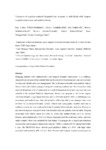Mostrar o rexistro simple do ítem
Evaluation of a patient-centered integrated care program for individuals with frequent hospital readmissions and multimorbidity
| dc.contributor.author | Piñeiro-Fernández, Juan Carlos | |
| dc.contributor.author | Fernández-Rial, Álvaro | |
| dc.contributor.author | Suárez-Gil, Roi | |
| dc.contributor.author | Martínez-García, Mónica | |
| dc.contributor.author | García-Trincado, Beatriz | |
| dc.contributor.author | Suárez-Piñera, Adrián | |
| dc.contributor.author | Pértega-Díaz, Sonia | |
| dc.contributor.author | Casariego-Vales, Emilio | |
| dc.date.accessioned | 2022-06-22T09:53:32Z | |
| dc.date.issued | 2021-10-29 | |
| dc.identifier.citation | Piñeiro-Fernández JC, Fernández-Rial Á, Suárez-Gil R, Martínez-García M, García-Trincado B, Suárez-Piñera A, Pértega-Díaz S, Casariego-Vales E. Evaluation of a patient-centered integrated care program for individuals with frequent hospital readmissions and multimorbidity. Intern Emerg Med. 2022 Apr;17(3):789-797. | es_ES |
| dc.identifier.issn | 1828-0447 | |
| dc.identifier.uri | http://hdl.handle.net/2183/30971 | |
| dc.description.abstract | [Abstract] Managing patients with multimorbidity and frequent hospital readmissions is a challenge. Integrated care programs that consider their needs and allow for personalized care are necessary for their early identification and management. This work aims to describe these patients' clinical characteristics and evaluate a program designed to reducing readmissions. This prospective study analyzed all patients with ≥ 3 admissions to a medical department in the previous year who were included in the Internal Medicine Department chronic care program at the Lucus Augusti University Hospital (Lugo, Spain) between April 1, 2019 and April 30, 2021. A multidimensional assessment, personalized care plan, and proactive follow-up with a case manager nurse were provided via an advanced hospital system. Clinical and demographic variables and data on healthcare system use were analyzed at 6 and 12 months before and after inclusion. Descriptive and survival analyses were performed. One hundred sixty-one patients were included. Program participants were elderly (mean 81.4 (SD 11) years), had multimorbidity (10.2 (3) chronic diseases) and polypharmacy (10.6 (3.5) drugs), frequently used the healthcare system, and were highly complex. Most were included for heart failure. The program led to significant reductions in admissions and emergency department visits (p = .0001). A total of 44.7% patients died within 1 year. The PROFUND Index showed good predictive ability (p = .013), with high values associated with mortality (RR 1.15, p = .001). Patients with frequent hospital readmissions are highly complex and need special care. A personalized integrated care program reduced admissions and allowed for individualized decision-making. | es_ES |
| dc.language.iso | eng | es_ES |
| dc.publisher | Springer | es_ES |
| dc.relation.uri | https://doi.org/10.1007/s11739-021-02876-9 | es_ES |
| dc.rights | This version of the article has been accepted for publication, after peer review and is subject to Springer Nature’s AM terms of use, but is not the Version of Record and does not reflect post-acceptance improvements, or any corrections. The Version of Record is available online at Springer Link. | es_ES |
| dc.subject | Case management | es_ES |
| dc.subject | Hospital readmissions | es_ES |
| dc.subject | Integrated health care systems | es_ES |
| dc.subject | Long-term care | es_ES |
| dc.subject | Multimorbidity | es_ES |
| dc.subject | Multiple chronic conditions | es_ES |
| dc.title | Evaluation of a patient-centered integrated care program for individuals with frequent hospital readmissions and multimorbidity | es_ES |
| dc.type | info:eu-repo/semantics/article | es_ES |
| dc.rights.access | info:eu-repo/semantics/embargoedAccess | es_ES |
| dc.date.embargoEndDate | 2022-10-29 | es_ES |
| dc.date.embargoLift | 2022-10-29 | |
| UDC.journalTitle | Internal and Emergency Medicine | es_ES |
| UDC.volume | 17 | es_ES |
| UDC.startPage | 789 | es_ES |
| UDC.endPage | 797 | es_ES |
Ficheiros no ítem
Este ítem aparece na(s) seguinte(s) colección(s)
-
INIBIC-ECB - Artigos [50]






